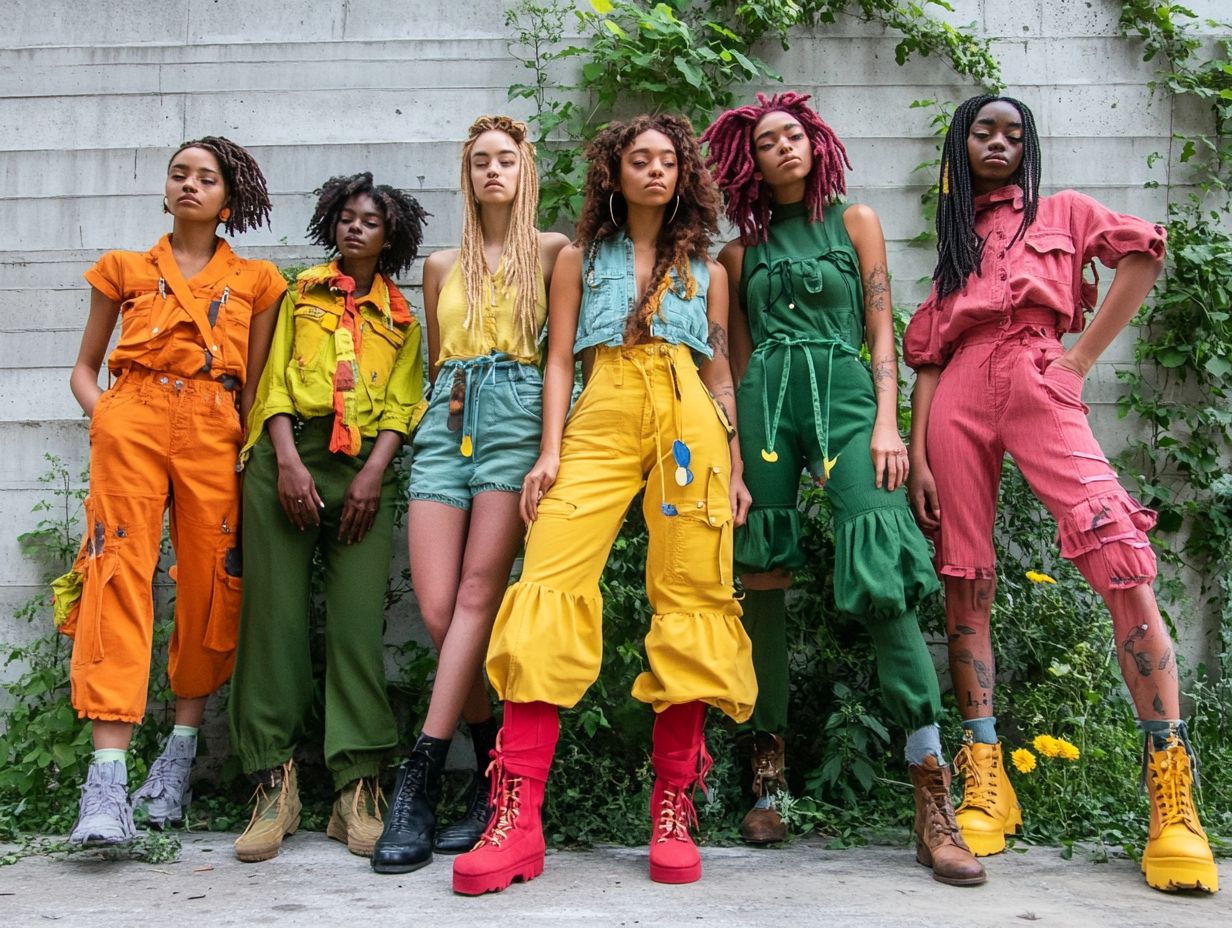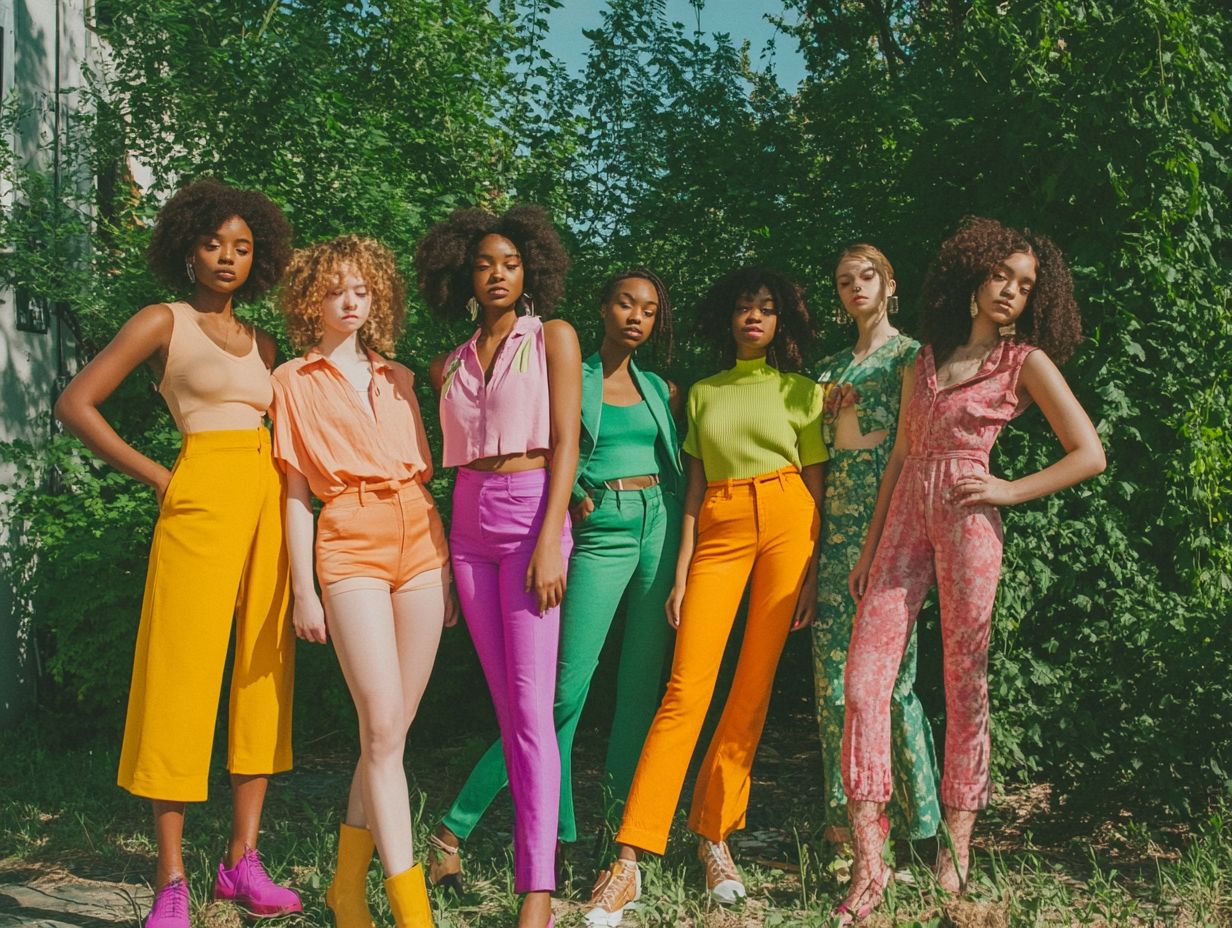The fashion industry is undergoing a transformative shift toward sustainability, with women leading the charge in this revolution. From innovative designers creating eco-friendly collections to brands prioritizing ethical practices, female visionaries are redefining what it means to be stylish while caring for our planet.
This article explores the significance of sustainable fashion, highlights influential women shaping the industry, and offers practical tips for incorporating sustainable choices into your wardrobe.
Discover how fashion can give the power to women and protect the environment.
The Rise of Sustainable Fashion

The rise of sustainable fashion signifies a crucial shift in the fashion industry, as eco-friendly choices increasingly influence consumer habits and brand practices.
In response to the environmental impact of traditional fashion methods, the use of eco-friendly materials, ethical sourcing, and innovative designs is transforming modern wardrobes.
Fashion trendsetters and advocates of conscious consumerism are advocating for responsible practices, making sustainability an essential part of the dialogue aimed at creating a better future for both the fashion industry and the world.
Understanding the Importance of Sustainable Fashion
The significance of sustainable fashion lies in its ability to balance consumption and production within the fashion industry, making it more responsible. This balance is increasingly crucial today, as the environmental impact of traditional fashion practices has become dramatically evident.
Sustainable fashion models demonstrate how mindful consumerism can benefit the planet. It promotes important concepts such as circular fashion, where materials are reused and repurposed, thereby reducing waste and minimizing environmental degradation. The use of biodegradable fabrics reinforces this concept, ensuring that garments do not contribute to landfill pollution.
Furthermore, sustainable fashion embodies social values related to body positivity and acceptance, creating a space where diverse body sizes and gender identities are represented. As consumers increasingly demand more ethical options, the fashion industry is gradually adapting to reflect these values, paving the way for a future that is more equitable and kinder to the earth.
Women Driving Change in the Fashion Industry

Women are at the forefront of driving positive change in the fashion industry by advocating for ethical fashion and female give the power toment through their designs and businesses. They are transforming the industry by creating clothing and establishing brands that emphasize the use of sustainable materials, inclusivity, and other values that resonate with conscious consumers.
Influential Female Designers and Brands
Female designers and brands are at the forefront of transforming the fashion industry by promoting sustainability and ethical practices as integral components of their design processes.
Sustainable Fashion Trends

Sustainable fashion trends are actively shaping the future of the industry, with an increasing focus on eco-friendly practices, slow fashion, and circular fashion concepts. As consumers become more conscious of their choices, trends such as upcycling, minimalist fashion, and the use of biodegradable fabrics are gaining traction.
This shift is paving the way for a fashion-forward approach that prioritizes sustainability.
Popular Sustainable Materials and Practices
Sustainable materials and practices are transforming fashion production by emphasizing environmentally friendly choices and innovative fashion technology. The industry is increasingly opting for alternatives that reduce environmental impact and promote sustainability, such as upcycled fabrics and biodegradable textiles.
Designers are leaning towards organic cotton, which is cultivated without toxic pesticides and synthetic fertilizers, significantly reducing the environmental footprint associated with conventional cotton farming. Additionally, recycled fabrics made from post-consumer plastics and post-industrial or post-consumer textiles are being utilized more frequently, showcasing the potential to convert waste into high-quality apparel.
New textile technologies that create fabrics from mushroom spores and agricultural waste are further expanding the possibilities for sustainable fashion. These initiatives align with responsible sourcing practices to ensure materials are ethically and sustainably obtained, resulting in a more environmentally conscious fashion industry.
Impact of Sustainable Fashion on the Environment

The impact of sustainable fashion on the environment is significant, as it offers solutions to some of the industry’s most pressing issues. The movement toward sustainable fashion is aiding in the reduction of environmental harm that the industry has historically inflicted on the planet by promoting ethical practices and the use of sustainable materials.
One key aspect is the reduction of waste. Sustainable and ethical fashion brands are committed to sourcing recycled or upcycled materials, including post-consumer waste, post-production waste, or other previously used materials that would otherwise end up in landfills. The European Union Textile Strategy aims to cut textile waste by 50% by 2030, emphasizing the need to promote a circular economy where every textile produced can be reused, repaired, or recycled, thereby minimizing waste.
Another important factor is the decrease in carbon emissions. Sustainable fashion brands often produce garments locally, which reduces not only lead times but also transportation needs, further lowering carbon emissions. Research from the UK-based Centre for Sustainable Fashion indicates that locally sourced garments have a carbon footprint that is 45% lower than that of imported garments.
Additionally, initiatives like circular fashion and slow fashion aim to decrease consumption by encouraging consumers to buy fewer, higher-quality garments and to keep their clothes for longer periods.
Finally, sustainable and ethical fashion organizations worldwide advocate for practices that focus on resource conservation, ethical labor, and transparency in the supply chain. By implementing eco-friendly practices, the fashion industry can play a significant role in combating climate change and preserving the planet for future generations.
Empowering Women Through Sustainable Fashion
Empowering women through sustainable fashion is a vital aspect of the movement, as it fosters collaboration and partnerships among female artisans while promoting community-based fashion initiatives.
Sustainable fashion enables women to actively participate in the industry and eliminates barriers, thereby uplifting individuals and strengthening communities, as well as enhancing cultural representation.
Supporting Female Artisans and Workers
Supporting female artisans and workers is essential for creating an inclusive and equitable fashion community that prioritizes ethical sourcing and a fair trade approach. This support is a vital part of the sustainable fashion movement, which promotes economic give the power toment and community development.
Initiatives aimed at supporting female artisans ensure that they are compensated fairly for their work while also providing them with the resources and skills necessary to thrive within their communities. Brands such as Aanya’s Collective and the Women’s Earth Alliance implement these initiatives through programs that promote sustainable practices and elevate marginalized creators.
Investing in such initiatives will help preserve traditional crafts and positively impact the lives of many women and their families, contributing to a sustainable future for all.
How to Incorporate Sustainable Fashion into Your Wardrobe
You can integrate sustainable fashion into your wardrobe by exploring thrift shopping, supporting sustainable brands, and choosing eco-friendly materials. This approach not only enhances your personal style but also promotes conscious consumerism and advocates for sustainable fashion.
Tips for Shopping and Styling Sustainably
Shopping and styling sustainably involves making choices that reflect current fashion trends while adhering to eco-friendly practices. Understanding how to integrate sustainable innovations into your personal style is crucial for promoting responsible fashion consumption.
The first step in this journey is to familiarize yourself with fabric technology, which can help you incorporate sustainable materials into your wardrobe. Sustainable innovations in fabric technology include the use of environmentally friendly materials such as organic cotton and Tencel, as well as recycled materials like recycled polyester.
Another important aspect of sustainable fashion is supporting ethical brands that prioritize fair labor practices and transparent supply chains. Identifying which brands are genuinely ethical is essential for sustainable shopping. Personal expression is also a key component of individual style, and sustainable innovations that facilitate this include upcycling and thrifted clothing. By revitalizing older pieces or purchasing secondhand items, individuals can create a unique style that reflects their personality while promoting sustainability.
Two additional factors that influence personal style through sustainable innovations are the emphasis on quality over quantity and the origin of each piece. Knowing that products are made ethically and sustainably enhances consumer satisfaction and contributes positively to their personal style.
